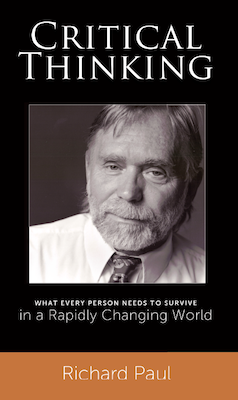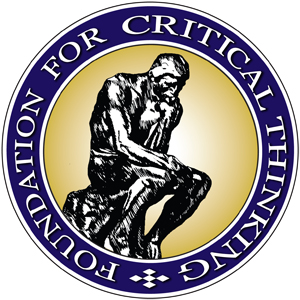
The first 8 chapters of Dr. Richard Paul's anthology, Critical Thinking: What Every Person Needs to Survive in a Rapidly Changing World, are found here. To access chapters 9-41, join the Center for Critical Thinking Community Online; a full copy of the book can be found in the libraries there.
For permission to use, please see our permissions page.
The print version of this title was published in 2012 by the Foundation for Critical Thinking in Tomales, California and contained 671 pages. It was edited by A.J.A. Binker.
{"id":"4154","title":"","author":"","content":"<p style=\"text-align: center;\"><img style=\"vertical-align: middle;\" src=\"https://www.criticalthinking.org/data/courses/Screen_Shot_2013_03_04_at_23440_PM_1.png\" alt=\"\" width=\"239\" height=\"400\" /> </p>\r\n<p style=\"text-align: center;\"> </p>\r\n<p style=\"text-align: left;\"><span style=\"font-size: medium;\">The first 8 chapters of Dr. Richard Paul's anthology, <em><span style=\"font-size: large;\">Critical Thinking: What Every Person Needs to Survive in a Rapidly Changing World,</span></em> are found here. To access chapters 9-41, join the <span style=\"text-decoration: underline;\"><strong><a href=\"https://community.criticalthinking.org/libraryForEducators.php\" target=\"_blank\">Center for Critical Thinking Community Online</a></strong></span>; a full copy of the book can be found in the libraries there. <br /></span></p>\r\n<p style=\"text-align: left;\"><span style=\"font-size: medium;\"> For permission to use, please see our <span style=\"text-decoration: underline;\"><strong><a style=\"font-size: medium;\" href=\"https://www.criticalthinking.org/pages/permission-to-use-our-work/1136\">permissions page</a></strong></span>.</span></p>\r\n<p style=\"text-align: left;\"><span style=\"font-size: medium;\">The print version of this title was published in 2012 by the Foundation for Critical Thinking in Tomales, California and contained 671 pages. It was edited by A.J.A. Binker.</span></p>","public_access":"1","public_downloads":"1","sku":"","files":[],"images":[]}
Chapter 1 - The Critical Thinking Movement in Historical Perspective
{"id":4118,"title":"Chapter 1 - The Critical Thinking Movement in Historical Perspective","author":"Richard Paul","content":"","public_access":"1","public_downloads":"1","sku":"","files":[{"id":536,"filename":"data/pages/48/4961767a3a4709bf9d4ec478c406391851352ae218fec.pdf","realfilename":"data/pages/48/4961767a3a4709bf9d4ec478c406391851352ae218fec.pdf","title":"Chapter 1 - The Critical Thinking Movement in Historical Perspective","order":0}],"images":[]}
Chapter 2 - Critical thinking: Basic Questions and Answers
{"id":4111,"title":"Chapter 2 - Critical thinking: Basic Questions and Answers","author":"Richard Paul","content":"","public_access":"1","public_downloads":"1","sku":"","files":[{"id":529,"filename":"data/pages/67/61e8707d68988d397f6a04cfd322768551351a50383c8.pdf","realfilename":"data/pages/67/61e8707d68988d397f6a04cfd322768551351a50383c8.pdf","title":"Chapter 2 - Critical thinking: Basic Questions and Answers","order":0}],"images":[]}
Chapter 3 - The Logic of Creative and Critical Thinking
{"id":4112,"title":"Chapter 3 - The Logic of Creative and Critical Thinking","author":"Richard Paul","content":"","public_access":"1","public_downloads":"1","sku":"","files":[{"id":530,"filename":"data/pages/45/81e55f0b9ba51f1b4baf1d12fa09931151351bc335ab4.pdf","realfilename":"data/pages/45/81e55f0b9ba51f1b4baf1d12fa09931151351bc335ab4.pdf","title":"Chapter 3 - The Logic of Creative and Critical Thinking","order":0}],"images":[]}
Chapter 4 - Critical Thinking in North America
{"id":4113,"title":"Chapter 4 - Critical Thinking in North America","author":"Richard Paul","content":"","public_access":"1","public_downloads":"1","sku":"","files":[{"id":531,"filename":"data/pages/85/cb5632d0de9eddbb51dd6c480948710151351f343c5ce.pdf","realfilename":"data/pages/85/cb5632d0de9eddbb51dd6c480948710151351f343c5ce.pdf","title":"Chapter 4 - Critical Thinking in North America","order":0}],"images":[]}
Chapter 5 - Background Logic, Critical Thinking, and Irrational Language Games
{"id":4114,"title":"Chapter 5 - Background Logic, Critical Thinking, and Irrational Language Games","author":"Richard Paul","content":"","public_access":"1","public_downloads":"1","sku":"","files":[{"id":532,"filename":"data/pages/88/7e9e15226d6326c1be3cadd7d0ba359c513520f7c3400.pdf","realfilename":"data/pages/88/7e9e15226d6326c1be3cadd7d0ba359c513520f7c3400.pdf","title":"Chapter 5 - Background Logic, Critical Thinking, and Irrational Language Games","order":0}],"images":[]}
Chapter 6 - A Model for the National Assessment of Higher Order Thinking
{"id":4115,"title":"Chapter 6 - A Model for the National Assessment of Higher Order Thinking","author":"Richard Paul","content":"","public_access":"1","public_downloads":"1","sku":"","files":[{"id":533,"filename":"data/pages/40/fe9f23bd821fcc3ac920a3ce58352412513525db13333.pdf","realfilename":"data/pages/40/fe9f23bd821fcc3ac920a3ce58352412513525db13333.pdf","title":"Chapter 6 - A Model for the National Assessment of Higher Order Thinking","order":0}],"images":[]}
Chapter 7 - Using Intellectual Standards to Assess Student Reasoning
{"id":4116,"title":"Chapter 7 - Using Intellectual Standards to Assess Student Reasoning","author":"Richard Paul","content":"","public_access":"1","public_downloads":"1","sku":"","files":[{"id":534,"filename":"data/pages/1/2f7be0ee3b1edaf0be0a47deea5c56cc5135276c5a499.pdf","realfilename":"data/pages/1/2f7be0ee3b1edaf0be0a47deea5c56cc5135276c5a499.pdf","title":"Chapter 7 - Using Intellectual Standards to Assess Student Reasoning","order":0}],"images":[]}
Chapter 8 - Why Students - and Teachers - Don't Reason Well
{"id":4117,"title":"Chapter 8 - Why Students - and Teachers - Don't Reason Well","author":"Richard Paul","content":"","public_access":"1","public_downloads":"1","sku":"","files":[{"id":535,"filename":"data/pages/68/ad3fdeec563587b4c98c281467789ed551352a0d5aba9.pdf","realfilename":"data/pages/68/ad3fdeec563587b4c98c281467789ed551352a0d5aba9.pdf","title":"Chapter 8 - Why Students - and Teachers - Don't Reason Well","order":0}],"images":[]}
{"id":4899,"title":"","author":"","content":"<p><span style=\"font-size: large;\">To access chapters 9-41, join the <span style=\"text-decoration: underline;\"><strong><a href=\"https://community.criticalthinking.org/libraryForEducators.php\" target=\"_blank\">Center for Critical Thinking Community Online</a></strong></span>; a full copy of the book can be found in the libraries there. </span></p>","public_access":"1","public_downloads":null,"sku":"","files":[],"images":[]}








